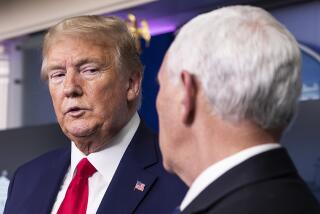Rice Blusters and Blunders
National security advisors are not above politics, even dirty politics. Henry Kissinger sought FBI wiretaps of his own National Security Council staff largely out of paranoia over a press report about secret U.S. bombing raids in Cambodia. Ronald Reagan’s national security advisor, John Poindexter, lied to Congress about the Iran-Contra affair and destroyed documents about it. But fact-free spin stretches only so far.
For the last several days, national security advisor Condoleezza Rice has been spearheading the campaign to disparage former White House counterterrorism chief Richard Clarke, who has accused the administration of bungling the war on terror. But Rice’s partisan and public attempts to subvert Clarke’s credibility, as The Times reports today, are only putting her own reputation at risk.
Rice has hammered away at Clarke, calling his assertion that the administration was painfully slow to grasp the danger posed by Al Qaeda before Sept. 11, 2001, “scurrilous.” Such an overheated response to Clarke’s measured language before the federal 9/11 commission Wednesday and in his new book suggests a lack of substantive response.
If Rice truly believes that Clarke is unfairly tarring the administration, she should publicly testify before the 9/11 commission. Rice has met in private with members of the commission, but she has stated that it would violate the Constitution’s separation of powers for a presidential staff member to appear before it. Although the president certainly has a right to confidential advice that won’t be aired publicly, a 2002 Congressional Research Service study says plenty of close presidential aides have testified in the past, including national security advisors Zbigniew Brzezinski in 1980 and Samuel R. “Sandy” Berger in 1994 and 1997.
Rice wants to have it both ways, denouncing Clarke publicly -- to the point of releasing a previously classified e-mail from him to undermine his credibility -- but not submitting to any questioning under oath.
President Bush kept up the attack Thursday, declaring in New Hampshire that “had I known that the enemy was going to use airplanes to strike America, to attack us, I would have used every resource, every asset, every power of this government, to protect the American people.” That simplistic contention evades the question asked by Clarke: Did the administration’s focus on Iraq and Saddam Hussein detract from grasping and responding to the larger terror threat?
No matter how controversial his book, Clarke has high standing as an anti-terrorism expert. He isn’t the issue. The questions he raises about the Bush administration’s approach to terror are. The administration must answer them with more than bluster or risk losing Americans’ confidence on this matter altogether.
More to Read
Sign up for Essential California
The most important California stories and recommendations in your inbox every morning.
You may occasionally receive promotional content from the Los Angeles Times.









